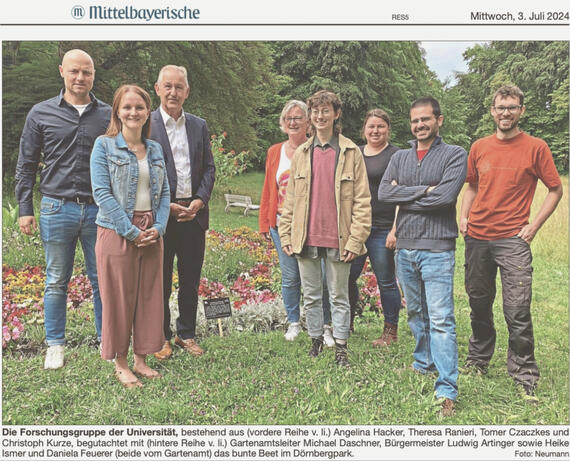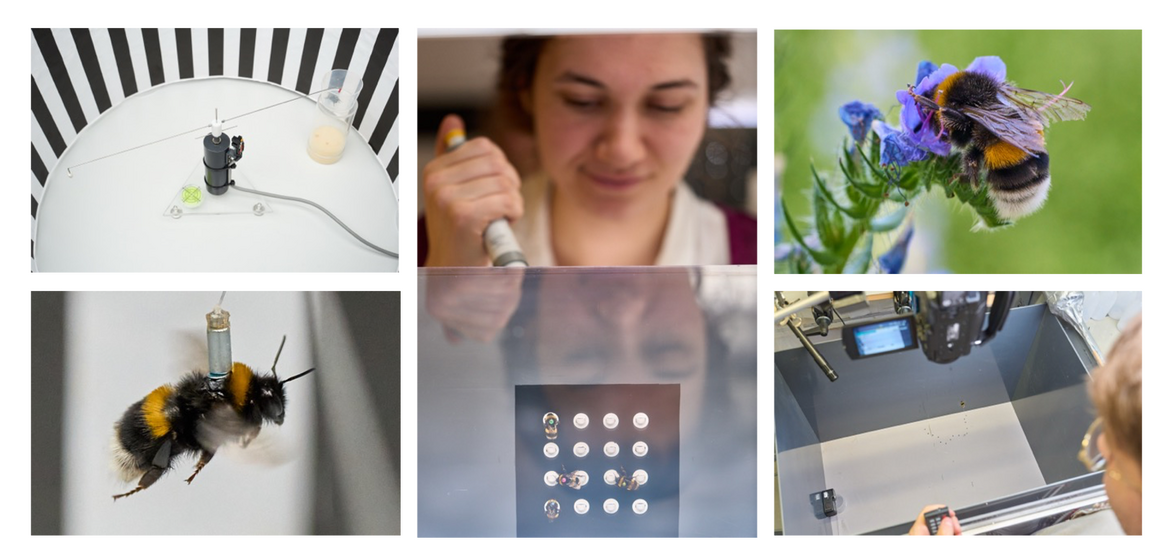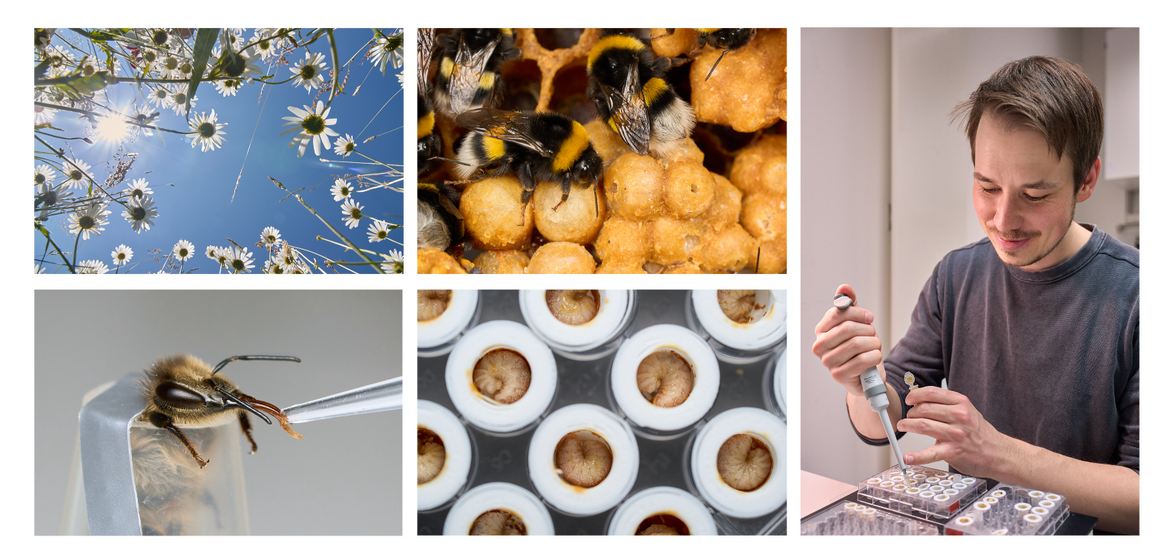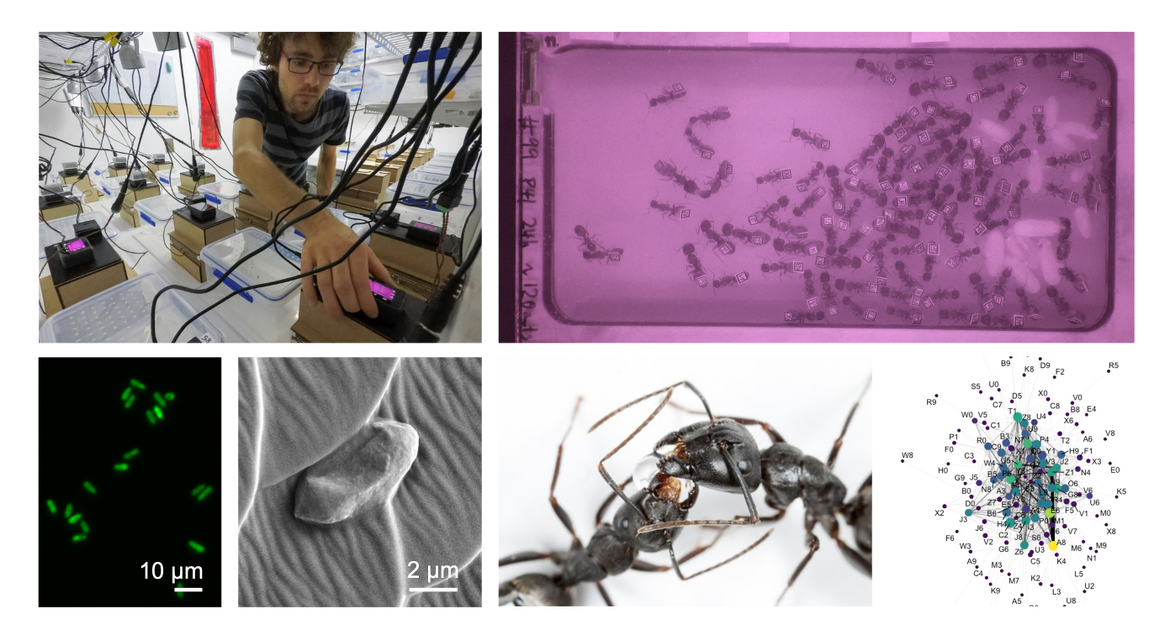Behavioural & Evolutionary EcologyWelcome to the Kurze Lab
Dr. Christoph Kurze
University Regensburg
Institute for Evolutionary Ecology
christoph.kurze[a]ur.de
Our research focuses on understanding the behavioural and evolutionary ecology of social insects, with a particular focus on bee health. Bee populations are in decline due to multiple environmental stressors, including infectious diseases, climate change, and land use intensification. Given the importance of bees as essential pollinators, our research aims to contribute to our understanding of disease dynamics, the effects of environmental stressors, and conservation strategies.We employ an integrative organismal approach that spans a range of methodologies, from classical physiological and molecular techniques to state-of-the-art behavioural experiments.Master projects opportunities
If you are interested in joining our lab, please don't hesitate to reach out for more information. We have exciting Master's projects available for passionate young scientists!Exciting NEWS 09/2025Welcome Carina Scheifele!Carina Scheifele joins us to conduct crucial research on pollinator health in our lab. She will specifically study the sublethal effects on an emerging infectious disease (EID) in bumblebees as part of DFG-funded project. We're excited to have her on our team!Brief projects summary:
The importance of bee health and food security has increased as bee populations decline due to various factors, potentially leading to a “pollination crisis.” The frequent spread of viruses, particularly deformed wing virus (DWV), to wild pollinators like bumblebees raises questions about the risks they pose to their fitness. Infectious diseases can have deleterious effects on the overall health of bees beyond mortality, but these sublethal effects are largely unknown. Pathogens can reduce foraging efficiency and increase resource acquisition costs, affecting colony fitness. The aim of this project is to investigate the sublethal effects of an emerging viral infection (DWV) on bumble bees. We will analyse the host's energy expenditure during flight and rest and assess the cognitive and behavioural changes induced by DWV over the course of the infection. The results will help to fill current knowledge gaps about the sublethal effects of an important emerging virus on bumblebees and improve our understanding of the potential risks it poses to wild pollinators.
Host manipulation & disease transmission
I am fascinated by how diseases spread within social groups, how parasites manipulate their hosts to enhance transmission, and how hosts evolve counter-adaptations in response.Due to time constraints, the transmission project in ants has been temporarily paused but will be resumed soon.

Supporting urban pollinator biodiversity
Our ongoing project aims to enhance park plantings in a cost-neutral way to boost pollinator biodiversity in Regensburg. This initiative is a partnership with Dr. Tomer Czaczkes and the Stadtgartenamt Regensburg.Variation in insect attractiveness of decorative plants (PeerJ, 2024)

Foraging efficiency in bumble beesAnimal fitness is linked to foraging efficiency, shaped by cognitive abilities and physiological traits. In social insects like ants, termites, and social bees, the division of labour is key to their colony success. Bumblebees, with their primitively eusocial structure, are an ideal model for studying how foraging behaviour, flight energetics, and cognitive skills influence colony fitness. My focus is on how factors such as age, health, and wing wear may influence their foraging and flight behaviour.My research combines traditional methods such as classical conditioning, flight mill assays and gene expression analysis with innovative approaches such as life-long behavioural tracking using RFID technology. By investigating how environmental stressors, such as parasites and climate change, impact bumblebees' foraging behaviour, I aim to enhance our understanding of the challenges bees face and their implications for colony fitness.Exciting NEWS (02/2025)
In the newly funded DFG project, Sublethal effects of an emerging infectious disease on foraging efficiency in bumblebees, we will expand our research on this topic by using RFID-enabled robotic flowers.Collaborators: PD Dr. Tomer Czaczkes (UR), Prof. Dr. Robert Paxton (MLU Halle), Prof. Dr. Lena Wilfert, and Prof. Dr. Tom Wenseleers (KU Leuven)Our recent papers on
Age & size shape flight performance (Proc. R. Soc. B, 2024)More exciting papers in preparation – stay tuned!

Impact of environmental stressors on bee life-historyEnvironmental stressors like heatwaves, resource scarcity, and pollution are increasingly threatening species, including bumblebees, as climate change and human activities amplify these challenges. I am particularly interested in how heatwaves, starvation, pesticide interactions (with adjuvants), and urbanisation affect bumblebee life-history, physiology and colony fitness.My research includes both controlled lab experiments (classical conditioning, in-vitro rearing, and cage studies) and field experiments (observations and sampling). The goal is to provide insights into how these stressors may impact bee populations in a rapidly changing world.Our recent papers on
Heatwave impacts on larval development (Biol. Open, 2025)
Urban bumblebee colony health (J. Anim. Ecol., 2022)More exciting papers in preparation – stay tuned!Collaborators: Dr. Panagiotis Theodorou (MLU Halle), Prof. Dr. Robert Paxton (MLU Halle), and Prof. Dr. Erhard Strohm (UR)

Disease transmission dynamicsWhile group living enhances individual fitness, it also increases the risk of disease transmission. Despite our understanding of how group size, built environment, and social interactions influence disease transmission in humans has advanced, much of the existing research is correlational. To address this gap, I conducted my largest and most challenging experiment to date during my Feodor Lynen fellowship (funded by the Alexander von Humboldt foundation). I have studied the spatial spread and transmission of a GFP-labeled fungal pathogen in 108 black carpenter ant nests as a model system. With invaluable support from my collaborators Dr. Danny Ziyi Chen (University of Notre Dame), Dr. Yizhe Zhang (Nanjing University), we tracked individual movements and their trophallaxis (mouth-to-mouth food sharing) behaviour by training a deep learning algorithm. This allows us to relate spore spread within the nest and transmission between individuals based on movement patterns and social network data. My goal is to provide insights that will enhance our ability to predict transmission dynamics in more complex scenarios.Due to time constraints, this project has been temporarily paused but will be resumed soon.Collaborators: Prof. Dr. David Hughes (Penn State University), Prof. Dr. Ephraim Hanks (Penn State University), Prof. Dr. Danny Ziyi Chen (University of Notre Dame), Dr. Yizhe Zhang (Nanjing University)Our papers on
Fungal spore transmission in ants (J. Invertebr. Pathol., 2020)Previous projects: During my PhD at Molecular Ecology Lab (Prof. Dr. Dr. hc Robin F.A. Moritz, MLU Halle), I investigated the molecular interplay between the intestinal parasite Nosema ceranae and its honeybee host, Apis mellifera. Following that, I contributed to a field study on the Zombie ant fungus (Ophiocordyceps) in Brazil as PostDoc at the Hughes lab (Penn State University).
Dr. Christoph Kurze
BEE Lab Team Leader
University Regensburg
christoph.kurze[a]ur.deBrief CV• since 2020 Teaching Assistant/PostDoc, University Regensburg (Prof. Dr. Erhard Strohm)
• 2019 Feodor Lynen Return Fellow, Martin-Luther-University Halle (Prof. Dr. Robert Paxton)
• 2016-2018 Postdoc & Feodor Lynen Fellow, Penn State University (Dr. David Hughes)
• 2015 DAAD doctoral fellow, University of Western Australia (Prof. Dr. Boris Baer)
• 2012-2016 PhD student, Martin-Luther-University Halle (Prof. Dr. Dr. hc Robin Moritz)
• 2012 MSc Thesis, IZW Berlin (Dr. Marion East & Prof. Dr. Heribert Hofer)
• 2010-2012 MSc Biodiversity, Evolution & Ecology, Freie Universität Berlin
• 2009-2010 ERASMUS, University of Aberdeen (Honors project/BSc Thesis, Dr. Jeremy Sternberg & Prof. Dr. John Speakman)
• 2007-2010 BSc Biology Justus-Liebig-Universität GießenTeaching contributions at URLectures
54102 – “Zytologie und Anatomie der Tiere” (BSc level)
54104 – “Formenkenntnis und Systematik von Tieren” (BSc level)
54562 – “Behavioural and Evolutionary Ecology” (MSc level)Courses
54102 – “Zytologie und Anatomie der Tiere” (BSc level)
54105 – “Formenkenntnis und Systematik von Tieren” (BSc level)
54128 – “Molekulare Ökologie & Evolutionäre Biologie” (BSc level)Research internships & paper writing skills
54532 – “Projektpraktikum: Molekulare und Evolutionäre Ökologie” (BSc level)
54538 – “Laborpraktikum: Functional morphology” (MSc level)
54540 – “Forschungspraktikum: Molekulare und Evolutionäre Ökologie” (BSc level)
54541 – “Laborpraktikum: Molecular ecology of insect-microbe interactions” (MSc level)
54547 – “Laborpraktikum: Molecular and Evolutionary Ecology” (MSc level)Seminar, poster, and essay assignments
54522 – Current topic about bee health (BSc & MSc level)Field courses
54105 – “Formenkenntnis und Systematik von Tieren” (BSc level)Supervision of MSc theses, BSc theses and ZulassungsarbeitenCollaborationsOngoing collaborations: PD Dr. Tomer Czaczkes (UR), Prof. Dr. Erhard Strohm (UR), Prof. Dr. Lena Wilfert (University Ulm), Prof. Dr. Joachim Ruther (UR), Prof. Dr. Robert Paxton (MLU Halle), Prof. Dr. David Hughes (Penn State University), Prof. Dr. Ephraim Hanks (Penn State University), Prof. Dr. Danny Ziyi Chen (University of Notre Dame), Dr. Yizhe Zhang (Nanjing University), Prof. Dr. Tom Wenseleers (KU Leuven), Heike Ismer (Gartenamt Regensburg/City council of Regensburg), Prof. Dr. Guntima Suwannapong (Burapha University)Previous collaborations: Dr. Panagiotis Theodorou (MLU Halle), Prof. Dr. Boris Baer (CIBER/UWA, now UC Riverside), Dr. Ryan Dosselli (CIBER/UWA), Dr. Yves Le Conte (INRA Avignon), Dr. Per Kryger (Aarhus University), Dr. Janina Kleemann (MLU Halle), Prof. Dr. Christina Fürst (MLU Halle), Dr. Nina E. Jenkins (Penn State University), Dr. Thomas Müller (Universitätsklinikum Halle), Dr. Christopher Mayack (now USDA ARS), Prof. Gabriele I. Stangl (MLU Halle)Reviewing ActivitiesSince 2024, I have been severing as a reviewer for the PeerCircle of the Alexander von Humboldt Foundation.Journals I have reviewed for include: Communications Biology, PLoS Pathogens, Environmental Microbiology, Scientific Reports, Frontiers in Genetics, Journal of Invertebrate Pathology, Environmental Microbiology Reports, Frontiers in Ecology and Evolution, Journal of Economic Entomology, Ecological Entomology, Journal of Insect Science, Insects, BMC Ecology, Ecology & Evolution, Journal of Apicultural Research, Insectes SociauxMembershipsGerman Zoological Society (DZG)
International Union for the Study of Social Insects (IUSSI) - Central European SectionInvited talks2025
• online PhD seminar, Burapha University, Thailand
2024
• International Conference on Beekeeping for Sustainable Agriculture and Ecosystem Services, Chonburi, Thailand
2022
• online PhD seminar, Burapha University, Thailand
2019
• Satellite Symposium at the 112th Annual Meeting of the German Zoological Society (DZG) “Microbes as drivers of animal intra- and interspecific interactions”, Jena, Germany
• Evolutionary ecology seminar, University of Bayreuth, Germany
2016
• 25th International Congress of Entomology, Orlando, USA
• SINNERS 7 meeting, Penn State University, USA
• Evolution seminar, Christian Albrecht University of Kiel, Germany
• Seminar, University of Exeter, Penryn Campus, UK
• Seminar, Max Planck Institute for Chemical Ecology, Jena, Germany
• 5th Host-Parasite Coevolution Symposium, Münster, Germany
2015
• North American Beekeeping Conference & Tradeshow of the American Beekeeping Federation (ABF), Anaheim, USA
• Seminar, Royal Holloway University of London, UK
2014
• 4th Host-Parasite Coevolution Symposium, near Kiel, Germany
• International Congress on Invertebrate Pathology and Microbial Control & 47th Annual Meeting of the Society for Invertebrate Pathology (SIP), Mainz, Germany
2013
• 3rd Host-Parasite Coevolution Symposium & RCNE meeting, near Berlin, GermanyOutreach and media coverage• Mittelbayerische Zeitung (Sep 22, 2025) about changing perspectives and what we can learn from insect research
• Woche der Botanischen Gärten at UR 2025
• Mittelbayerische Zeitung (Jun 14, 2025) about effects of droughts on insect populations
• UR Science Blog (Apr 8, 2024) about our Urban Pollinator Conservation Project
• Mittelbayerische Zeitung (Dec 12, 2024) lastest News from our Urban Pollinator Conservation Project
• Heise Verlag (Oct 19, 2024) about behavioural ecology in bumblebees
• Spektrum Wissenschaft Verlag (Jul 31, 2024) about our Proc. R. Soc. B paper on flight performance in bumblebee workers
• Mittelbayerische Zeitung (Jul 3, 2024) about our Urban Pollinator Conservation Project• The Great Insect Fair at Penn State University
• North American Beekeeping Conference & Tradeshow of the American Beekeeping Federation (ABF) in Anaheim (USA) 2015
• presentations for local bee keepers clubs (Imkervereine) in Sachsen-Anhalt and Thüringen
Current team members
Carina Scheifele (PhD candidate)
Franziska Altmann (MSc student)
Erik Köhler (MSc student)
Maja Achatz (MSc student)
Verena-Katharina Baumstark (BSc student)
Marlene Glas (BSc student)You are looking to join an exciting research project on bee health? We welcome applications from highly motivated, reliable individuals who are passionate about our research.Alumni at UR
Theresa Ranieri (MSc student)
Angelina Hacker (MSc student)
Laura Seebauer (BSc student)
Jana Schweiger (BSc student)
Joshua Mühlig (BSc student)
Tizian Frohn (BSc student)
Lea Bayr (BSc student)
Julia Burger (BSc student)
Simone Antesberger (BSc student)
Maximilian Mandlinger (MSc student)
Julia Seidl (MA student, Lehramt)
Sophia Laimer (MA student, Lehramt)
Sarah Ossner (BSc student)
Lara Schreiber (MSc student)
Sandra Lausser (BSc student)
Laura Wögler (BSc student)
Milena Gilgenreiner (MA student, Lehramt)
Jonas Zetlmeisl (MA student, Lehramt)
Helena Schulte (BSc student)
Carolin Bäuml (BSc student)
Jia Li (BSc student)
Sara Humbs (BSc student)
Mia Handel (BSc student)
Anna Greis (BSc student)
Julius Lechner (BSc student)
Janka Plate (BSc student)and numerous 3- and 6-week interns :)







